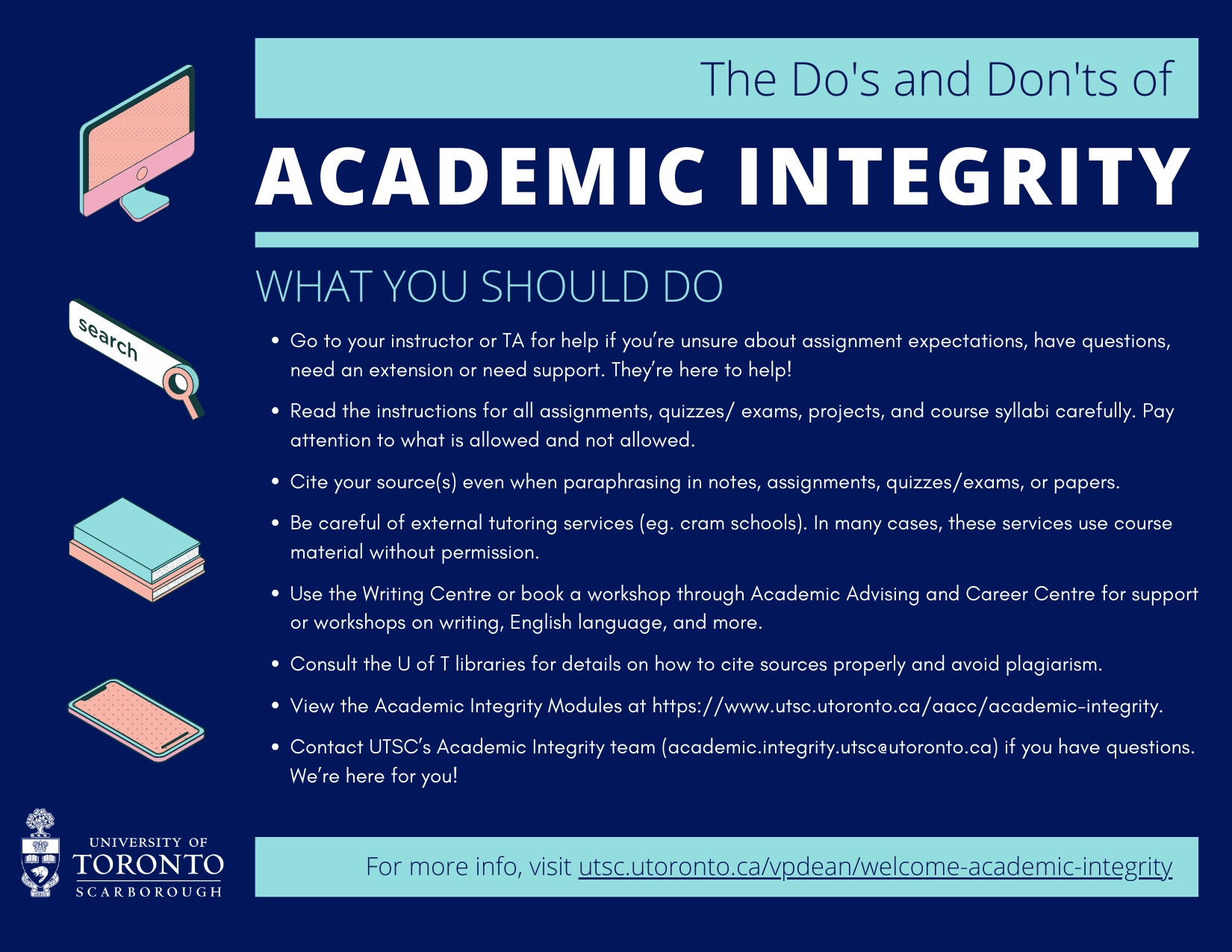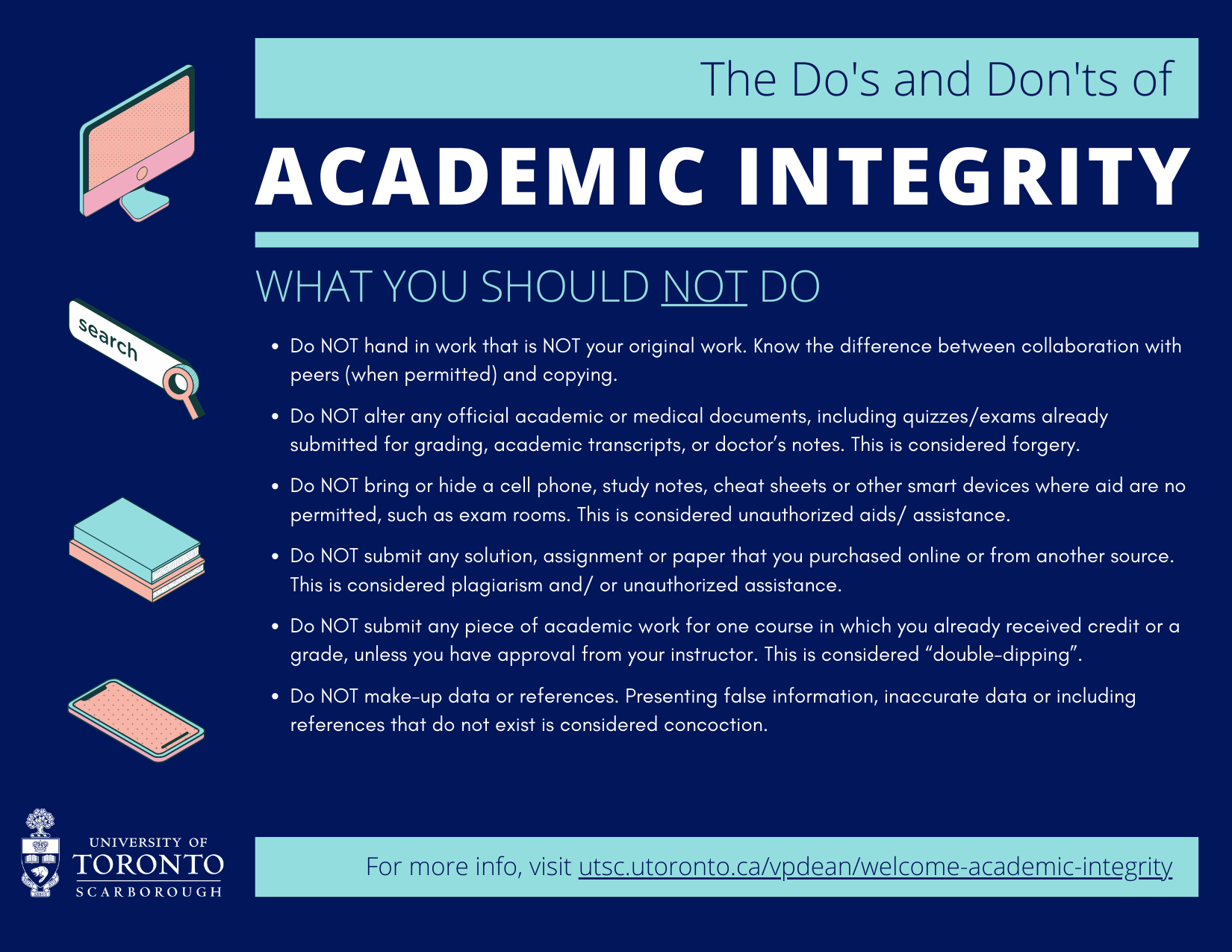Sections on this page:
We understand you’re more than just a student and have several responsibilities on a daily basis. Consider some quick do’s and don’ts to help you on your academic integrity journey.
Do:
- Go to your instructor or TA for help if you’re unsure about assignment expectations, have questions, would like an extension, or need support. They’re here to help!
- Read the instructions for all assignments, quizzes/exams, projects, and course syllabi carefully, making sure to understand your instructor’s expectations of what’s allowed and not allowed.
- Cite your source(s) even when paraphrasing other’s scholarly work in your study notes, assignments, quizzes/exams, or papers. Failure to do so may result in an allegation of plagiarism.
- Utilize the Writing Support Centre, the English Language Development Centre, and Academic Advising and Career Centre for support or workshops on writing, the English language, and more.
- Consult the U of T Scarborough Library for details on how to cite sources properly and avoid plagiarism.
- View academic integrity modules available via the Academic Advising & Career Centre.
- Make sure your writing and work is in your own words, even when working as part of a team or studying in a group.
- Respond to any emails from your instructor or Academic Integrity Office in a timely manner.
- Contact the Academic Integrity Office if you have questions: academic.integrity.utsc@utoronto.ca. We’re here to help!
Don’t:
- Don’t utilize tutoring services (example, cram schools). In many cases these services use course material without the university’s permission. The University of Toronto takes this very seriously.
- Don’t alter any official academic or medical documents, including quizzes/exams already submitted for grading. This is considered forgery.
- Don’t bring or hide a cell phone, camera or headphones, study notes, or cheat sheet to a quiz/exam where aids are not permitted. This is considered unauthorized assistance.
- Don’t submit any solution, assignment, or paper that you purchased online or from another source. This is considered plagiarism and/or use of unauthorized aid.
- Don’t re-submit any piece of academic work which you've already received credit for in another course, unless you have approval from your instructor. This is known as “double-dipping.”
- Don’t drop the course when any alleged academic integrity offences occur – continue to complete all your assignments.
- Don’t neglect your mental and physical health. For support go to Health & Wellness Centre.
Team Work and Academic Integrity
When working as a team, each team member is responsible for the work submitted collectively by the team. This includes work that may be considered academically dishonest, or in which an academic offence has been committed. In other words, if one of your team members takes a shortcut and copies material from the internet or a past assignment, or simply isn’t aware of the rules regarding appropriate citation for sources consulted, the whole team faces consequences that may arise from an allegation of academic misconduct. It is up to each team member to be sufficiently familiar with the work being submitted; to check each other’s work for proper citations and originality; and to be aware of the relevant policies. Ignorance of the rules does not excuse cheating or plagiarism. If you have any doubts, be sure to consult your instructor or Academic Advising & Career Counselling BEFORE you submit the work.
Avoiding Exam Offences
Tests and exams can be tense even at the best of times. The following tips can help you avoid being reported for an offence:
- Listen carefully to all exam announcements. Officials make them for your benefit and to remind you of things you may have forgotten. If you don’t understand something, don’t hesitate to ask an invigilator – they are there to assist.
- Don’t keep your phone in your pockets or on your desk. All electronic devices are considered unauthorized aids in an exam. It is an offence to have one even if you never use it and it is off. Put it at the front of the room with the rest of your things, leave it at home, or keep it in a resealable bag on the floor under your desk.
- Read the exam paper for warnings of “No Aids.” If no aids are allowed, this means all study notes, calculators, phones, iPods, dictionaries, etc. must be packed away, even if it was OK to have them during tests earlier in the course.
- Empty your pockets. Make sure you didn’t forget about your phone, iPod, or the notes you were reading on the subway.
- Bring your TCard and extra photo ID, just in case. Exam officials will check your card and ask you to sign an attendance list.
- Take nothing to your desk except what you need to write the exam: pens, pencils, eraser, ID. Pencil cases should be left with your other belongings.
- Don’t sit next to your friends. This removes the temptation to sneak a peek at their answer paper or for your friend to ask you for the time or for assistance.
- In order for your exam to be graded, you must confirm that you'll abide by the Code of Behaviour on Academic Matters
- Clearly write your student number (no names!)
- Write your section number and instructor's name.
- Mark an 'X' in the Code of Conduct acknowledgement box.
- Avoid doing anything that could be interpreted as suspicious. This includes:
- Looking at other students’ papers
- Writing answers in large letters that can be easily seen by your neighbours.
- Talking to your neighbours about anything at all.
- Talking to yourself!
- Stop writing at the end of the exam. Continuing to write after the end of the exam is announced is an offence.
- Get a good night’s sleep. Being well-rested will help you concentrate and reduce anxiety.
Academic Advising and Career Centre has a guide on Test Preparations you may review as well!
Be Cautious of External Tutoring Services!
You might see flyers on campus or online that offer tutoring services and help with your coursework. While we all need help at times, be careful using these services. In some cases, they provide an unfair academic advantage or use course materials without the permission of the university. The University of Toronto Scarborough takes this very seriously and you be found responsible for an academic offence related to utilizing such a service.
Tutoring Practices that May Pose an Academic Offence Risk (adapted from UTM’s Academic Integrity Unit website):
- Collaborating with others, or sharing assessed answers, on social media platforms.
- Posting your assignment online, or sending it directly to your tutor, to get assistance answering the questions.
- Having someone help you complete all or part of your essay/homework/problem set, whether or not you are paying for the service. This includes someone making changes for you during the editing process.
- Using a translation service, software, or asking another individual to translate your assessed essay/homework into English.
- Attending supplementary classes or using tutoring businesses can be highly problematic if they use your instructor's notes, slides, handouts, or other course material but are offered by individuals and businesses not formally affiliated with the University. There is also concern throughout the U of T Scarborough community about businesses that sell course-related tutoring services that write or edit students' assignments. While some learning support businesses are legitimate, others may lead you, even without intention, to violate U of T Scarborough's academic integrity policies.
Acceptable Tutoring Practices, Services, and Supports (adapted from UTM’s Academic Integrity Unit website):
- Studying with a classmate or in a group is an acceptable practice, as long as you are not working together to solve homework problems, writing assignments, or other work that is going to be assessed individually.
- Seeking the help of paid or volunteer tutors who are not affiliated with the University is acceptable - as long as they do not help you to complete your assessed work. Tutors should help you strengthen your knowledge of the subject area by clarifying concepts, and help you to improve your academic skills, such as time management.
- Getting tutoring support by someone who speaks your first language is acceptable - as long as this individual does not help you to complete your assessed work.
- If you have questions regarding any coursework, attend the office hours of your Teaching Assistant or Professor for extra help.
Instead of external companies, consider using the University of Toronto Scarborough's on-campus supports:
| "I don't know how to start my essay!" -- Visit The Writing Support Centre or utilize Library tutorials. |
| "I am worried about my English skills..." -- Visit the English Language Development Centre. |
| "I need extra help with a lab or assignment." -- Talk to your Professor or your TA. Consider asking for an extension. Remember your instructors WANT to help you! |
| "I don't know if I am citing my sources the right way..." -- Ask your Professor or your TA for clarification, or visit The Writing Support Centre and utilize Library tutorials. |
| "I need extra practice or studying help before the exam!" -- Access the Old Exam Repository, ask your Prof or TA for help, or consider joining a facilitated study group. |
| "I have my friend's or family member's old assignments...." -- Be careful not to copy them. Consider removing them from your computer. Ask your Professor or TA for clarification if needed. |

